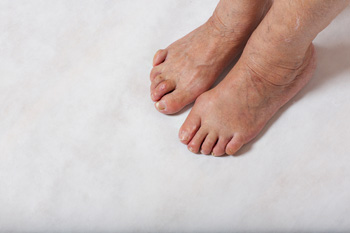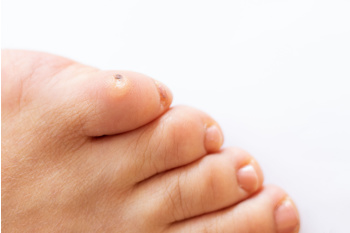
Foot and ankle injuries are common among baseball players due to the sport's dynamic movements, including running, pivoting, and quick direction changes. Ankle sprains, one of the most frequent injuries, occur when the ligaments in the ankle are stretched or torn, usually from rolling or twisting the ankle during sudden movements. These sprains can range from mild to severe, causing pain, swelling, and limited mobility. Other foot injuries, such as stress fractures or tendonitis, may also occur from repetitive stress or wearing improper footwear. To manage these injuries, rest, compression, and elevation are essential for reducing swelling and promoting healing. Preventive measures, such as wearing supportive footwear, warming up properly, and strengthening ankle and foot muscles, can reduce the risk of these injuries. If you have sustained a foot or ankle injury, it is suggested that you consult a podiatrist who can offer you appropriate treatment solutions.
Sports related foot and ankle injuries require proper treatment before players can go back to their regular routines. For more information, contact Pasquale Cancelliere, DPM of Candria Foot and Ankle Specialists. Our doctor can provide the care you need to keep you pain-free and on your feet.
Sports Related Foot and Ankle Injuries
Foot and ankle injuries are a common occurrence when it comes to athletes of any sport. While many athletes dismiss the initial aches and pains, the truth is that ignoring potential foot and ankle injuries can lead to serious problems. As athletes continue to place pressure and strain the area further, a mild injury can turn into something as serious as a rupture and may lead to a permanent disability. There are many factors that contribute to sports related foot and ankle injuries, which include failure to warm up properly, not providing support or wearing bad footwear. Common injuries and conditions athletes face, including:
- Plantar Fasciitis
- Plantar Fasciosis
- Achilles Tendinitis
- Achilles Tendon Rupture
- Ankle Sprains
Sports related injuries are commonly treated using the RICE method. This includes rest, applying ice to the injured area, compression and elevating the ankle. More serious sprains and injuries may require surgery, which could include arthroscopic and reconstructive surgery. Rehabilitation and therapy may also be required in order to get any recovering athlete to become fully functional again. Any unusual aches and pains an athlete sustains must be evaluated by a licensed, reputable medical professional.
If you have any questions please feel free to contact our offices located in Londonderry, NH and Salem, NH . We offer the newest diagnostic and treatment technologies for all your foot and ankle needs.

When it comes to correcting rigid hammertoe deformities, surgery often includes the use of implants to help straighten and stabilize the toe. One important decision in this process is whether to use a permanent implant or one that can be removed later. Permanent implants are designed to stay in place indefinitely, providing long-term support and alignment. They are often chosen for their durability and the convenience of not requiring a second procedure for removal. Removable implants offer flexibility. Once the toe has healed in the proper position, these implants can be taken out, leaving the body free of foreign materials. The choice between permanent and removable implants depends on several factors, including the severity of the deformity, the patient’s lifestyle, and overall health. If you have a painful rigid hammertoe, it is suggested that you obtain a personalized consultation with a podiatrist who will help you determine the most appropriate solution for its correction
Hammertoe
Hammertoes can be a painful condition to live with. For more information, contact Pasquale Cancelliere, DPM from Candria Foot and Ankle Specialists. Our doctor will answer any of your foot- and ankle-related questions.
Hammertoe is a foot deformity that affects the joints of the second, third, fourth, or fifth toes of your feet. It is a painful foot condition in which these toes curl and arch up, which can often lead to pain when wearing footwear.
Symptoms
- Pain in the affected toes
- Development of corns or calluses due to friction
- Inflammation
- Redness
- Contracture of the toes
Causes
Genetics – People who are genetically predisposed to hammertoe are often more susceptible
Arthritis – Because arthritis affects the joints in your toes, further deformities stemming from arthritis can occur
Trauma – Direct trauma to the toes could potentially lead to hammertoe
Ill-fitting shoes – Undue pressure on the front of the toes from ill-fitting shoes can potentially lead to the development of hammertoe
Treatment
Orthotics – Custom made inserts can be used to help relieve pressure placed on the toes and therefore relieve some of the pain associated with it
Medications – Oral medications such as anti-inflammatories or NSAIDs could be used to treat the pain and inflammation hammertoes causes. Injections of corticosteroids are also sometimes used
Surgery – In more severe cases where the hammertoes have become more rigid, foot surgery is a potential option
If you have any questions please contact our offices located in Londonderry, NH and Salem, NH . We offer the newest diagnostic and treatment technologies for all your foot and ankle needs.

Corns are hard, thickened areas of skin that typically form on the toes or feet, often with a cone-like shape pointing inward. They develop due to friction and pressure, commonly from wearing ill-fitting shoes, high heels, or repetitive activities like walking or running. The constant pressure causes the skin to thicken as a protective response, leading to pain and discomfort, especially while walking. While home treatments may offer temporary relief, professional care from a podiatrist is often necessary for persistent or painful corns. A podiatrist can remove corns safely and effectively using specialized instruments, reducing the risk of infection or further damage to the skin. This type of doctor can also assess your foot structure, gait, and footwear, identifying underlying causes like bunions, hammertoes, or misalignment. Afterward, they can recommend custom orthotics, proper footwear, or other treatment to prevent future corns. If you have corns on the feet, it is suggested that you schedule an appointment with a podiatrist for an evaluation and safe treatment.
Corns can make walking very painful and should be treated immediately. If you have questions regarding your feet and ankles, contact Pasquale Cancelliere, DPM of Candria Foot and Ankle Specialists. Our doctor will treat your foot and ankle needs.
Corns: What Are They? And How Do You Get Rid of Them?
Corns are thickened areas on the skin that can become painful. They are caused by excessive pressure and friction on the skin. Corns press into the deeper layers of the skin and are usually round in shape.
Ways to Prevent Corns
There are many ways to get rid of painful corns such as:
- Wearing properly fitting shoes that have been measured by a professional
- Wearing shoes that are not sharply pointed or have high heels
- Wearing only shoes that offer support
Treating Corns
Although most corns slowly disappear when the friction or pressure stops, this isn’t always the case. Consult with your podiatrist to determine the best treatment option for your case of corns.
If you have any questions please feel free to contact our offices located in Londonderry, NH and Salem, NH . We offer the newest diagnostic and treatment technologies for all your foot and ankle needs.




